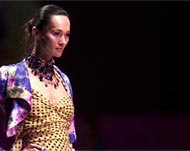China: counterfeit goods very popular
A ground-breaking raid by anti-counterfeiting investigators at a clothing industry fair in Beijing has highlighted the difficulties of trying to stamp out China’s burgeoning forgery trade.

On the hunt for fake clothing, investigators from the Bureau of Industry and Commerce swooped on the Palace of Exhibitions which had been hosting the 12th China International Clothing and Accessories Fair.
The raid by uniformed investigators was nothing new. But for the first time it resulted in the closure of a stand following complaints lodged by renowned fashion house Pierre Cardin.
The French clothing giant had drawn investigators’ attention to a Chinese company operating under the name ‘Italy Pierre Cardin’ and using a logo virtually identical to its own.
Another Chinese company claiming to sell products for ‘Pierre Cardin France’ was ordered to remove leaflets on display and is also the subject of an investigation, sources told AFP.
The two cases underscored the problems of tackling counterfeiting in China, where officials regularly turn a blind eye to the niceties of international copyright law.
 |
|
It’s often difficult to tell the real |
“As far as we are concerned, the companies involved had authentic documentation, officially registered. I am in no position to say whether the papers were false or not,” trade fair organiser Wang Zhuo said.
“I’m satisfied at the actions that have been taken, but at our level we can’t do anything about this sort of thing.”
Subtle changes
The cunning of China’s counterfeiters was also illustrated in the case, where subtle changes had been made to the distinct Pierre Cardin logo.
“On the certificate seized by authorities, Italy Pierre Cardin had reduced the size of our logo and added three small Chinese characters but when used on publicity materials and clothing it’s clearly our logo that is imitated,” said Song Huaigui, director-general of Pierre Cardin China.
Song said counterfeiting in China, particularly in the textiles and fashion sectors, had never been so prevalent despite the country’s 2001 entry into the World Trade Organisation (WTO).
“There are more and more copies but we won’t stop from bringing them to justice,” Song said.
Duty-bound
Hubert Bazin, a French lawyer based in Shanghai, said China was duty-bound to honour its agreements entered into as part of its accession to the WTO.
“But counterfeiting is so widespread that the situation can’t be changed overnight,” Bazin said.
 |
|
Counterfeits result in huge losses |
According to foreign experts, China’s counterfeiting empire accounts for 70% of the world’s fake goods.
“We need much stronger deterrent legislation to stamp it out, but Chinese laws don’t go nearly far enough,” said Paul Ranjard, another French lawyer based in Beijing.
“In China, counterfeiting is only considered a crime when the goods are completely identical and produced in huge quantities,” said Ranjard, who has been hired to safeguard the interests of fashion house Lacoste in China.